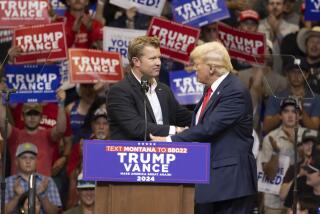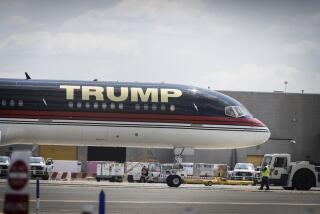Montana Gov. Steve Bullock enters 2020 Democratic presidential race

- Share via
Montana Gov. Steve Bullock elbowed his way Tuesday into the crowded Democratic field for president, presenting himself as a political reformer who’s achieved results in his Republican-leaning state by showing a rare capacity to work across partisan lines.
“I don’t have the luxury of just talking to people who agree with me,” Bullock said in a video announcing his candidacy. “I go all across our state’s 147,000 square miles and look for common ground to get things done.”
With Bullock’s entry, the Democratic field grew to nearly two dozen contestants, the largest in modern history.
Finishing his second and final term, Bullock, 53, hopes to distinguish himself with his Western pedigree — he grew up in Helena and, as a newsboy, delivered papers to the governor’s mansion — and his accomplishments in a state President Trump carried by more than 20 percentage points.
Bullock won reelection on that same November ballot and has since worked with a Republican-run Legislature to pass a six-year expansion of the federal Medicaid program, continuing one of the major achievements of his first term. The program, expanding care to nearly 100,000 Montana residents, was made possible by the Affordable Care Act, which many Republicans fiercely oppose.
Bullock also worked with GOP lawmakers to enact legislation limiting the influence of anonymous donors and making Montana’s elections more transparent.
He suggests the state is a model of how government can, and should, work.
“We see each other as neighbors first,” Bullock said in his January State of the State address. “When making political decisions, we still share a common set of facts. By and large, we treat one another with respect, even when we disagree. Our politics are more than a sport, or a zero-sum game.”
Who’s running for president and who’s not »
As Democrats debate how best to reclaim the White House — spurring turnout in blue states or building on the party base by winning over independents and persuadable Republicans — Bullock suggests they can do both.
“Democrats don’t always show up in places where it might be a harder sell,” he said in a fall 2017 interview as he eyed a presidential bid. “I think we’re getting to the point where at times it’s data and analytics that say, ‘You grab this group, this group, this group, this region, this region, this region, you got an electoral win.’
“If all you’re doing is flying over states like Montana — not just Montana — most of middle America, going to raise money as opposed to actually stopping in, that’s not showing up.”
Bullock has been weighing a White House bid for some time, paying half a dozen visits to Iowa, which casts the first presidential ballots next February, and making the rounds of political chat shows and talk festivals.
He has already made one notable policy shift, on gun control, to align himself with prevailing sentiment within the national Democratic Party; Bullock now supports both a ban on semiautomatic weapons as well as universal backgrounds checks for gun purchasers.
His delayed entry — Bullock insisted on waiting until the Legislature finished its every-other-year session — could make it difficult to qualify for the first round of presidential debates, scheduled for the end of June. He planned to follow Tuesday’s announcement with a trip later this week to Iowa.
Democrats face internal rift as progressives condemn a policy to protect incumbents »
Democrats in Washington tried hard to dissuade Bullock from seeking the White House, urging him instead to challenge Montana’s freshman Republican senator, Steve Daines, who is up for reelection in 2020.
The failure to convince Bullock is one of a number of recruiting disappointments for Democrats, who had also hoped to persuade Beto O’Rourke, John Hickenlooper and Stacey Abrams to take on Republican Senate incumbents in Texas, Colorado and Georgia, respectively. O’Rourke and Hickenlooper are both pursuing White House bids and Abrams has said she is considering a presidential run.
“I’ve expressed all along I just don’t have an interest in running for U.S. Senate,” Bullock said in a March interview for the Montana Lowdown podcast. “I think that my skill set and what I’ve done, I just wouldn’t enjoy it, so I’d ruled it out.”
More to Read
Get the L.A. Times Politics newsletter
Deeply reported insights into legislation, politics and policy from Sacramento, Washington and beyond. In your inbox twice per week.
You may occasionally receive promotional content from the Los Angeles Times.











